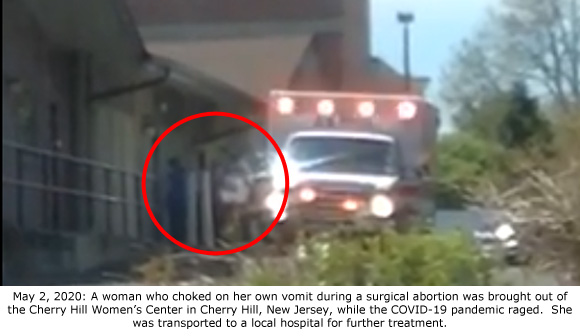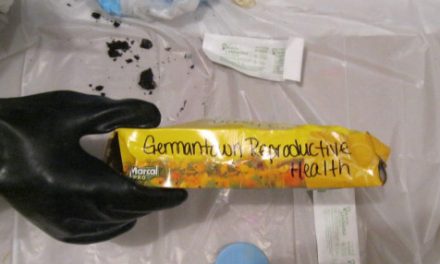By Cheryl Sullenger
Cherry Hill, NJ – A woman choked on her own vomit during a surgical abortion at the Cherry Hill Women’s Center in Cherry Hill, New Jersey, and required emergency transport to the Cooper Medical Center for suspected aspiration pneumonia.
This occurred on May 2, 2020, during a serious COVID-19 outbreak when elective abortions were banned due to a strain on medical resources. Abortions in New Jersey were exempted from the ban.
After the vomiting episode during the abortion, the 35-year old woman suffered a drop in her oxygen levels. Once the abortion was completed, she was placed in a recovery room where her oxygen levels failed to fully recover.
She was not provided supplemental oxygen at the abortion facility.

Pro-life witnesses at the scene recording the woman being removed from the abortion facility on a gurney. The ambulance had lights flashing, but ran without sirens.
The Cherry Hill Women’s Center is an affiliate of the National Abortion Federation, whose members include some of the most-cited abortion facilities in the nation for violations of health and safety requirements.* It has recently added the more dangerous late-term abortions for “fetal anomalies,” which means it may conduct abortions through all nine months of pregnancy.
“It is ironic that during a time when the nation was shut down in order to save lives from the Coronavirus, this abortion business was allowed to remain open, ending the lives of countless innocent babies, and placing women in danger. This incident took medical resources that were supposed to be reserved for COVID-19 patients,” said Troy Newman, President of Operation Rescue. “This is just another of hundreds of medical emergencies we have documented at abortion facilities nationwide, and is further evidence that abortion is not safe for women and is fatal to unborn babies.”
Read the CAD printout for this emergency.
*Visit AbortionDocs.org where information about deficiencies at abortion facilities are easily searchable. AbortionDocs.org contains nearly 29,000 documents related to licensing issues, health citations, medical malpractice, criminal cases, and more.





